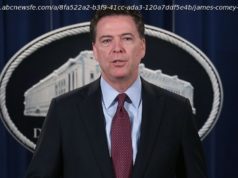Iran’s incumbent President Hassan Rouhani had a commanding 59 percent lead over his rivals in an initial and partial count of votes in the election, according to official figures announced…
TEHRAN, Iran (AP) — Iran’s incumbent President Hassan Rouhani had a commanding 59 percent lead over his rivals in an initial and partial count of votes in the election, according to official figures announced Saturday morning. Deputy Interior Minister Ali Asghar Ahmadi told journalists in a televised news conference that more than 40 million Iranians voted in Friday’s election. That puts turnout above 70 percent. The strong margin for Rouhani will, if it holds, be enough to give him an outright victory and avoid a two-person runoff next Friday. In 2013, Rouhani won the presidential election with nearly 51 percent of the vote. Turnout for that vote was 73 percent. Election officials repeatedly extended voting hours until midnight to accommodate long lines of voters, some of whom said they waited hours to cast their ballots. Friday’s vote was largely a referendum on Rouhani’s more moderate political policies, which paved the way for the landmark 2015 nuclear deal that won Iran relief from some sanctions in exchange for curbs on its nuclear program. The 68-year-old has come to embody more liberal and reform-minded Iranians’ hopes for greater political freedom at home and better relations with the outside world. Preliminary vote tallies have him ahead with 22.8 million votes, out of 38.9 million counted so far. His nearest challenger is hard-line cleric Ebrahim Raisi, with 15.5 million votes. The two other candidates left in the race, Mostafa Mirsalim, a former culture minister, and Mostafa Hashemitaba, a pro-reform figure who previously ran for president in 2001, respectively have 455,000 and 210,000 votes each. Hashemitaba was among the first to predict an outright win for Rouhani as he offered his congratulations Saturday morning. «Rouhani will apply his ever-increasing efforts for the dignity of Iran» in his next term, the reformist said. Although considered a moderate by Iranian standards, Rouhani was nonetheless the favorite pick for those seeking more liberal reforms in the conservative Islamic Republic. He appeared to embrace a more reform-minded role during the campaign as he openly criticized hard-liners and Iran’s powerful Revolutionary Guard, a paramilitary force involved in the war in Syria and the fight against Islamic State militants in neighboring Iraq. That gave hope to his supporters, who during recent campaign rallies called for the release of two reformist leaders of the 2009 Green Movement who remain under house arrest. The two figures, Mir Hossein Mousavi and Mahdi Karroubi, both endorsed Raisi, as did Mohammad Khatami, another reformist who served as Iran’s president from 1997 to 2005. Iran has no credible political polling to serve as harder metrics for the street buzz around candidates, who need more than 50 percent of the vote to seal victory and avoid a runoff. But what scant data that was available before the vote showed Rouhani in the lead. Iran’s president is the second-most powerful figure within Iran’s political system. He is subordinate to the country’s supreme leader, who is chosen by a clerical panel and has the ultimate say over all matters of state. It is still a powerful post. The president oversees a vast state bureaucracy employing more than 2 million people, is charged with naming Cabinet members and other officials to key posts, and plays a significant role in shaping both domestic and foreign policy. All candidates for elected office must be vetted, a process that excludes anyone calling for radical change, along with most reformists. No woman has ever been approved to run for president. Ahmadi said the Interior Ministry expects to announce final results later Saturday. ___ Associated Press writer Jon Gambrell contributed reporting from Dubai, United Arab Emirates. ___ Follow Adam Schreck on Twitter at www.twitter.com/adamschreck and Nasser Karimi at www.twitter.com/ncarrimi. Copyright 2017 The Associated Press. All rights reserved. This material may not be published, broadcast, rewritten or redistributed.






